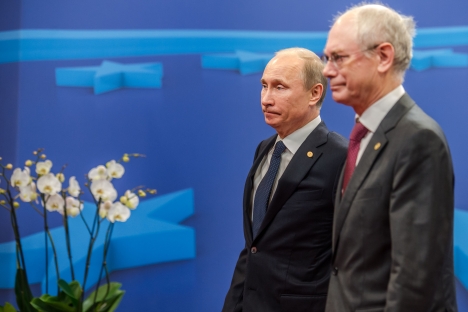
Russian President Vladimir Putin (left) and European Council President Herman Van Rompuy during the Russia-EU summit. Source: AP
The “third energy package” was the main point of contention at the 30th Russia-EU summit held in Brussels on Dec. 21. Russian President Vladimir Putin and the president of the European Commission, José Manuel Barroso, could not reach a deal behind closed doors and continued their discussion in front of the press.
While Moscow is prepared to wait until all 27 EU member countries come to an agreement on the visa question, its stance on natural gas is tougher.
The economies of Russia and the EU have become increasingly interdependent, Putin said. Progress has been made in all key areas: mutual trade rose by almost a third in 2011, to $394 billion; at least $400 billion could be expected going forward, believes the Russian president.
What does Moscow expect from Russia-EU summit?
Russia-EU summit to yield more questions than answers
The EU’s share in Russia’s trade is 48.8 percent, and nor is this the limit, Putin claims. The most important thing is for Europeans to lift all export restrictions, now that Russia has become a WTO member.
As far as visas are concerned, the technical matters have been resolved and the issue hinges on a political decision by the European Union, the Russian leader said. The EU borders are open to citizens of Mexico, Venezuela, and Honduras, the Russian president noted. “Everyone's in this group – forty states that are located thousands of kilometers away from the EU,” said Putin.
To this “purely political question,” he retorted with an economic argument: Russian tourists spend more than 18 billion euros ($23.7 billion) annually in EU stores. The lack of visa-free travel is holding back the development of economic ties.
Putin understands that the 27 different countries may have different approaches. “But we have to be patient and move toward this goal as part of a dialog,” he said. Moscow is prepared to wait for its European partners to become ready for this decision.
“Let us not get the wrong idea about the visas,” the European Commission president said. “We are all aiming toward visa-free travel with the Russian Federation.” Barroso claims that the EU has been facilitating entry for Russians. The Europeans issued 5,260,000 visas to Russian citizens last year – 62 percent more than in 2010.
That being said, the summit’s main discussion concerned the “third energy package,” which has drawn Moscow’s particular ire. The dispute boiled over the limits of a closed-door discussion to continue in the presence of journalists.
At first, Putin had some harsh words to say on the subject at the meeting, calling the decision to make the “third energy package” retroactive uncivilized. He then told a press conference that Russia was meeting a third of the EU’s natural gas and oil needs and explained why the document cannot be applied to contracts that predate it.
“Our European partners said during the discussion that they were complying with legal norms,” the Russian president said, citing a document that underlies relations between Russia and the EU. Its Article 34 prohibits the parties from taking measures that would worsen the conditions for their respective commercial activity. He claims that the adoption of the “third energy package” was a direct violation of this provision.
“The European partner complies with all international obligations and the principles of the supremacy of law,” said Barroso, disagreeing with Putin. “Our system is not discriminatory, as it applies to companies from any region of the world.”
The European Commission president continued on to say that the new regime had in fact expanded business opportunities instead of narrowing them. This is also evidenced by the facts on the ground: according to Barroso, the presence of Russian companies in the European energy markets is much more solid than five years ago. “But your companies must respect our rules,” he said.
As soon as the European official finished speaking, Russia’s president replied: “My longtime friend Mr. Barroso explained his position so emotionally and at length because he feels he’s not right, that he’s wrong.”
At the same time, Putin admitted that such disputes constitute a normal negotiating process. “We have been arguing with Mr. Barroso this way for years,” said Putin. “However, we have solved many problems and have already reached $400 billion in annual trade.”
Russian Foreign Minister Sergei Lavrov said that the “Magnitsky Act” was discussed at the meeting, as well.
“Our president also explained the ins and out of it all: that apart from the fact of a human tragedy, which is subject to a continuing court examination, there’s also the fact of another investigation, which concerns William Browder, whose lawyer was Sergei Magnitsky,” said Lavrov.
“The Hermitage Capital fund was caught acting illegitimately in our financial market, evading taxes,” the foreign minister said. “So let’s not forget that there’s also this component in it, besides the human tragedy itself, which still needs to be sorted out.”
While both investigations continue, the story is being used to inappropriate ends, the minister said, insisting that concerns over human rights should not be politicized.
On balance, both sides described the summit as constructive and frank. European Council President Herman Van Rompuy said that, despite all disagreements, common interests were still the most important thing.
Sergei Markov, vice chancellor of the Plekhanov Russian Economic University and Civic Chamber member, said that, while not a “breakthrough,” the summit could be considered entirely successful, because both sides continued their dialogue on the most challenging issues.
“This is a working summit, part of a large work in progress,” said Markov, as quoted by RIA Novosti.
First published in Russian in Rossiyskaya Gazeta.
All rights reserved by Rossiyskaya Gazeta.
Subscribe
to our newsletter!
Get the week's best stories straight to your inbox